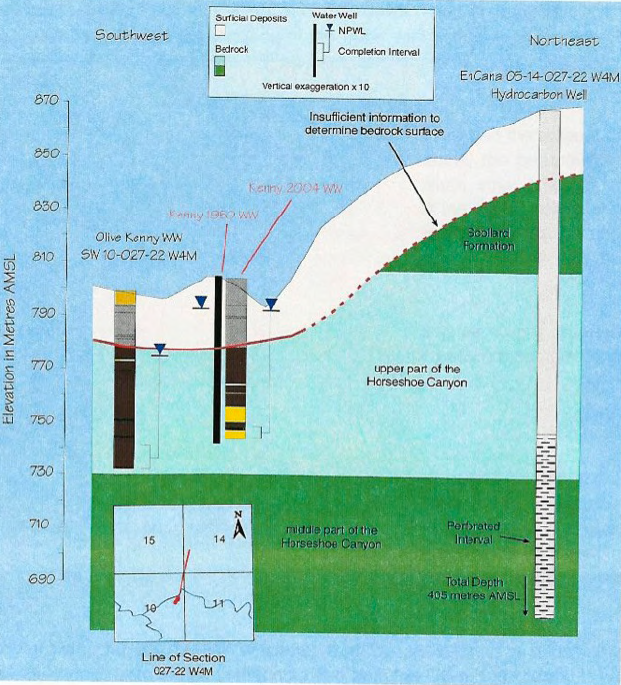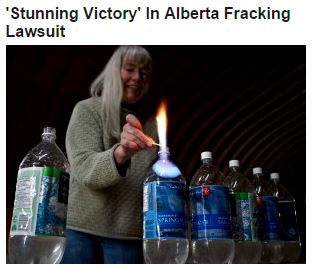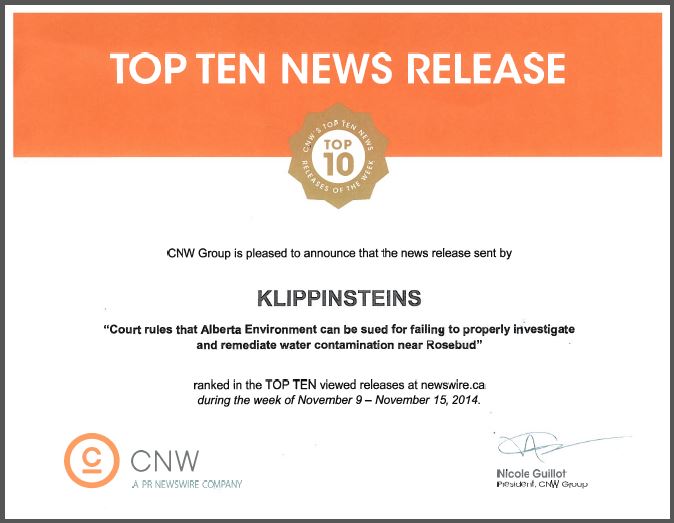Alberta Won’t Appeal Decision to Allow Jessica Ernst to Sue, Landowner’s landmark lawsuit against the fracking industry continues by Andrew Nikiforuk, December 10, 2014, TheTyee.ca
Jessica Ernst, the businesswoman and oil patch scientist defiantly challenging the regulation of hydraulic fracturing in Alberta, has scored another legal victory.
The Alberta government will not appeal a recent ruling that allows Ernst to sue Alberta Environment for the alleged negligent investigation of water well contamination during the shallow fracking of coal seams in central Alberta.
The Alberta government, which is highly dependent on hydrocarbon revenue, gave no reason to the Canadian Press for not appealing the decision.
Last month, Alberta Chief Justice Neil Wittmann dismissed all key arguments made by the government of Alberta against the lawsuit of Ernst, including the fear that it may unleash a flood of lawsuits against a government that supports hydraulic fracking of energy wells with numerous subsidies.
The Alberta government argued that Ernst’s $33-million lawsuit had no merit; that the government owed no duty of care to landowners with contaminated water; and that the government had statutory immunity.
But Wittmann’s ruling disagreed on all major counts and ordered the lawsuit against the government to proceed. “While this is a novel claim, I find there is a reasonable prospect Ernst will succeed in establishing that Alberta owed her a prima facie duty of care,” Wittmann wrote.
Ernst cautiously welcomed the government’s decision. “It cost me a year of time in my lawsuit and lots of money, but it is a major victory,” she said.
“There is still a lot of hell ahead. The government maintains that fracking is safe and that all methane contamination of water wells is natural. I think my lawsuit, which is built on corporate and regulatory data, will prove things differently.”
Ernst added that she looks forward to the Alberta government’s statement of defence “and the disclosure of many more dirty details in document exchange.”
To date, Ernst has filed more than 2,000 documents with Encana to support her lawsuit. The gas giant must disclose its documents by Dec. 19.
The suit so far
Ernst’s seven-year-old lawsuit alleges that Encana, a pioneer of hydraulic fracturing, drilled and fractured shallow coal bed methane wells directly in her local groundwater supply between 2001 and 2004 near Rosebud, Alberta, polluting Ernst’s water well with enough toxic chemicals and methane to make it flammable.
The lawsuit also alleges that two provincial regulators, the Energy Resources Conservation Board (ERCB) and Alberta Environment, failed to act on documented and repeated violations of the law.
Chief Justice Wittman, however, struck the ERCB from the case last year on the grounds it couldn’t be sued or charged with breaching Canada’s Charter of Rights due to an immunity clause.
Ernst’s lawsuit alleges that the ERCB (now the Alberta Energy Regulator) violated her constitutional rights by falsely accusing her of making criminal threats and banishing all contact with her due to her outspoken criticism of the board.
After Alberta’s Court of Appeal upheld Wittmann’s decision in favor of the ERCB, Ernst told her lawyers to take the case to the Supreme Court.
If the Supreme Court hears the case (only a small percentage are heard), Ernst’s lawyers will argue that immunity clauses in provincial legislation cannot protect the state and “block an individual from seeking a remedy for breach” of her fundamental rights and freedoms under the nation’s Charter of Rights.
ERCB’s response
Glenn Solomon, a prominent Calgary lawyer representing the ERCB, filed a response to Ernst’s special filing before the Supreme Court.
“The ERCB submits that there is no legal issue of general importance which requires further guidance from this Court nor any injustice to the Applicant to remedy,” says the document.
Last year, Solomon advised a global oil and gas driller seeking legal help for his mother, Ann Craft, that suing energy regulators was akin to “World War Three” and that a citizen would be “crazy” to do so.
In a taped iPhone conversation, Solomon, one of Alberta’s top energy litigators, also explained how the multi-billion-dollar fracking industry actively bought the silence of landowners claiming damages with buy-outs and confidentiality agreements.
Fracking still contentious
Hydraulic fracturing, the pressurized injection of fluids, chemicals and sand into shallow and deep rock formations as tight as granite, has sparked concerns about earthquakes, methane leaks, groundwater contamination, land fragmentation and toxic air pollution across the continent.
Although industry lobbyists still contend that fracking poses no risk to groundwater, studies and textbooks by petroleum geologists tell a vastly different story.
The Nontechnical Guide to Petroleum Geology, Exploration, Drilling and Production by Norman J. Hyne, for example, spells out the hazards bluntly: “A well can be fracked several times during its lifetime and in some instance, however, hydraulic fracturing can harm a well by fracking into water. The hydraulically induced fractures extend vertically into a water reservoir that floods the well with water.”
The popular book is cited in numerous journals and industry websites.
Ernst said that Hyne’s description fits what happened to the aquifer near her home in Rosebud, during a frenzied drilling boom for shallow sands and coal bed methane, an unconventional resource with marginal economic returns.
In Rosebud, Encana repeatedly fracked directly into the aquifer, according to a 2005 report by Hydrogeological Consultants. The report has been disclosed to Encana in what’s known as a document exchange.

Encana’s 2004 fracs into Rosebud’s drinking water aquifers, in the 2005 report by Hydrogeological Consultants Ltd for Encana.
Jessica Ernst legal battle: Alberta will not appeal ruling by John Cotter, Canadian Press, December 9, 2014, Beaconnews.ca
ROSEBUD, Alta. — Alberta will not appeal a court ruling that says a woman can sue the province over hydraulic fracturing she alleges has so badly contaminated her well that the water can be set on fire.
Jessica Ernst began legal action against Alberta’s energy regulator and Calgary-based energy company Encana in 2007…. Last month, Chief Justice Neil Wittmann of Court of Queen’s Bench dismissed the government’s application to strike it from the lawsuit.
An Alberta Justice spokeswoman gave no reason for the government’s decision not to appeal.
Ernst alleges fracking…released hazardous amounts of chemicals such as methane into her well and that her concerns were not properly investigated.
She says she is delighted and surprised by the province’s decision not to appeal and is looking forward to reading the government’s statement of defence.
“After seven arduous years a stunning victory stands,” Ernst said Tuesday from her home in Rosebud. “The truth will have its day in court.”
In its statement of defence, Encana has denied all of Ernst’s allegations.
In September, the Alberta Court of Appeal upheld another ruling that said Ernst could not include the province’s energy regulator in her lawsuit.
Ernst said she is seeking leave to appeal the September ruling to the Supreme Court of Canada. [Emphasis added]
Jessica Ernst Fracking Battle: Alberta Will Not Appeal Court Ruling by John Cotter, Canadian Press, December 9, 2014, Huffingtonpost.ca
Alberta will not appeal court ruling that allows lawsuit over fracking by John Cotter, The Canadian Press, December 9, 2014, Calgary Herald
Court rules that Alberta Environment can be sued for failing to properly investigate and remediate water contamination near Rosebud November 10, 2014
Tuesday’s Letters: Hope for rights of the individual by Grant Dorosh, Stony Plain, November 18, 2014, Edmonton Journal
Re: “A victory for the little guy,” Editorial, Nov. 13
One small victory in Court of Queen’s Bench does not mean winning the war for individual rights versus the state in our Canadian court system. There remain at least two other levels of appeal.
The Supreme Court of Canada also holds the right not to hear a case should an appeal be successful to the Alberta Court of Appeal.
The Ernst case, and the recent decision of the Supreme Court of Canada in the Trial Lawyers of British Columbia vs. the B.C. Attorney General waiving costly hearing fees, give hope that the rights of the individual to challenge the government “cost effectively” will also triumph in our courts in future.
One can only hope our superior courts will also now view individual challenges to government in a timely fashion as equally important within our concept of “the rule of law.”
***
let us speak for Jessica by Julie Ali, December 9, 2014, Reading Children’s Books
here is the future that has come to Alberta
we see one woman
who has been brave
stand firm in her claim
here is the future that has come to Alberta
Jessica Ernst works for all of us
she says the truth to the government of Alberta
which must accept the truth of what was done to her
here is the future that has come to Alberta
we stand by the side of the gate that is locked still to us
the gate to the place of burning water and shame
when will we enter there? when will we admit what was done to her?
here is the future that has come to Alberta
only one woman and the entire oil and gas industry against her
with the full cooperation of the troops in the Progressive Conservative Party of Alberta
not to mention the armies in the Progressive Conservative Party of Canada
here is the future that has come to Alberta
long may the truth be said in rural towns and hamlets
we have a government that has denied the truth to the people
until Jessica Ernst said her words of discipline and courage
here is the future that has come to Alberta
let us speak for Jessica
she has done the work
of ten thousand Albertans
[Thank you, Ms. Ali, for this tribute]
parlons pour Jessica translation by Amie du Richelieu, December 10, 2014
voici ce qu’est devenu l’avenir en Alberta
nous voyons une femme
qui a été brave
qui a tenu bon avec sa réclamation
voici ce qu’est devenu l’avenir en Alberta
Jessica Ernst travaille pour nous tous
elle fait voir la vérité au gouvernement de l’Alberta
qui doit accepter la vérité de ce qu’on lui a fait
voici ce qu’est devenu l’avenir en Alberta
nous sommes debout à côté de la barrière qui nous est toujours barrée
la barrière qui mène à l’endroit où brûle l’eau et la honte
quand allons-nous y entrer? quand avouerons-nous ce qu’on lui a fait?
voici ce qu’est devenu l’avenir en Alberta
une seule femme et l’entière industrie pétrolière et gazière contre elle
avec la pleine coopération des troupe du Parti Progessiste-Conservateur de l’Alberta
sans oublier les armées du Parti Progressiste-Conservateur du Canada
voici ce qu’est devenu l’avenir en Alberta
puisse-t-on dire la vérité dans les villes rurales et les hameaux
nous avons un gouvernement qui a nié la vérité aux gens
jusqu’à ce que Jessica Ernst ait dit ses mots de discipline et de courage
voici ce qu’est devenu l’avenir en Alberta
parlons pour Jessica
elle a fait le travail
d’une dixaine de milliers d’Albertains
Signé: Julie Ali


